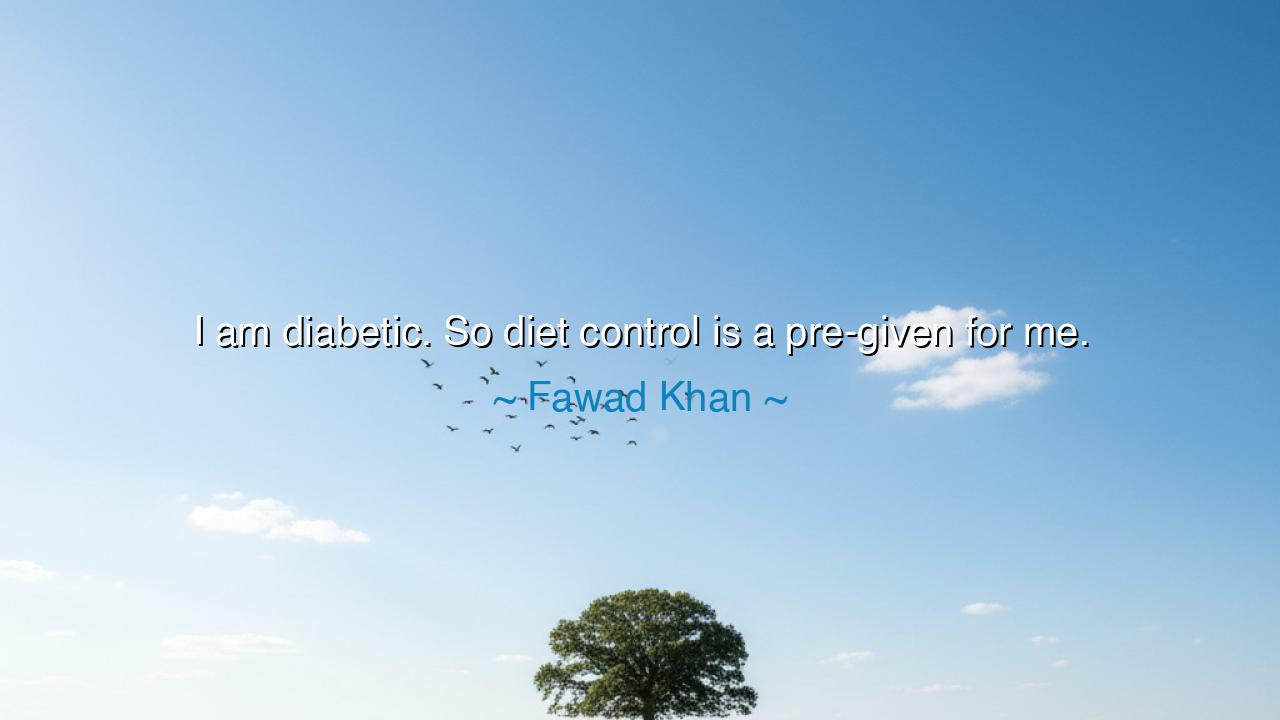
I am diabetic. So diet control is a pre-given for me.






When Fawad Khan said, “I am diabetic. So diet control is a pre-given for me,” he spoke with the quiet strength of one who has accepted discipline not as burden, but as destiny. His words may appear simple, but beneath them lies a profound philosophy — one that speaks to the eternal law of balance, sacrifice, and self-mastery. For in this single sentence, he reveals a truth that the ancients themselves knew well: that when life places a limitation upon us, it is not a curse, but a calling to greater awareness and control. His condition became his teacher, and through it, he learned the art of self-governance — the wisdom of restraint that leads not to weakness, but to freedom.
The origin of this truth stretches back to the dawn of civilization. The sages of Greece, India, and China all taught that health is not the absence of illness, but the presence of harmony — a balance between what we desire and what we require. To live well, one must know one’s boundaries and honor them. The diabetic, therefore, is not unlike the ascetic or the monk: both are bound by rules that, at first, seem restrictive, yet in truth are liberating. By accepting the necessity of dietary control, Fawad Khan reminds us that wisdom often comes through necessity — that to live fully within limits is a higher art than to live recklessly without them.
In the ancient East, the Ayurvedic masters spoke of the principle of Ahara — mindful eating — as one of the pillars of health. They believed that every bite of food carries with it not only nourishment but intention. To eat without awareness was to invite chaos into the body; to eat with discipline was to preserve the order of life. So too does Fawad’s statement carry this essence: that when he says “diet control is a pre-given,” he means that awareness of one’s intake, of one’s boundaries, becomes not a burden but a way of life. It is the recognition that the body is a temple, and to preserve it, one must act with reverence.
His condition — diabetes — is the modern reminder of what the ancients already knew: that indulgence is the enemy of vitality. In the old kingdoms, there were stories of rulers who succumbed to feasts and luxury until their health decayed. One such tale tells of the Persian King Cambyses II, who, consumed by appetite and pride, neglected moderation and fell into madness and disease. His excess became his undoing. But the wise, like Fawad, learn from the past. They do not curse their limitations — they refine themselves through them. The diabetic who accepts his path becomes like the disciplined monk, ruling not a kingdom of men but a kingdom of the self.
And what does it mean to live with diet control? It means to live consciously, to eat with awareness, to understand that what enters the body shapes the mind, the heart, and the spirit. In a world ruled by temptation and excess, this form of self-command is rare and sacred. Fawad Khan’s tone is not one of complaint but of calm acceptance, even of empowerment. His discipline, forced by circumstance, becomes a form of enlightenment — a reminder that mastery of one’s habits is mastery of one’s fate. He lives not in denial, but in devotion to balance.
The deeper meaning, then, is that every challenge can be a teacher. Illness is not always an enemy; sometimes it is the stern hand that guides us toward wisdom. Just as a sculptor chips away stone to reveal the statue within, life chips away indulgence to reveal the strength of the soul. Through dietary restraint, Fawad Khan has discovered what philosophers and mystics have always preached — that freedom is born of discipline, not desire. His “pre-given” is not a chain, but a compass, pointing toward harmony and longevity.
Let this, then, be your lesson: you need not wait for illness to awaken your discipline. Begin today. Honor your body with awareness; eat with purpose, not impulse. Choose nourishment over indulgence, and gratitude over greed. As Fawad Khan’s words remind us, control is not the loss of pleasure, but the refinement of pleasure — the art of finding satisfaction in health, balance, and inner strength.
So, children of the modern age, remember: life will place limits upon each of us — age, circumstance, or condition. Do not curse them. Accept them as your teachers. For in every boundary lies an opportunity to grow wiser, stronger, and freer. As Fawad Khan teaches through his calm example, discipline is not the end of freedom — it is its beginning.






AAdministratorAdministrator
Welcome, honored guests. Please leave a comment, we will respond soon